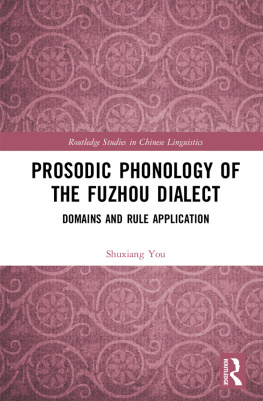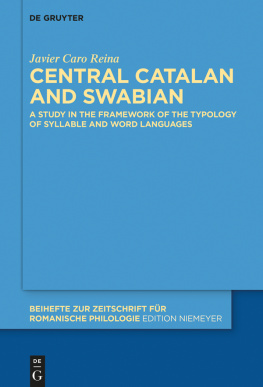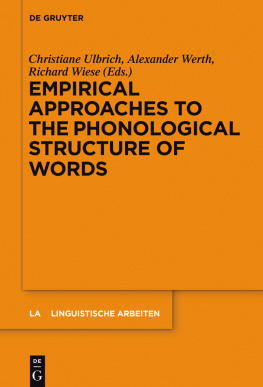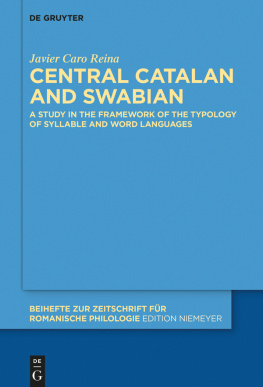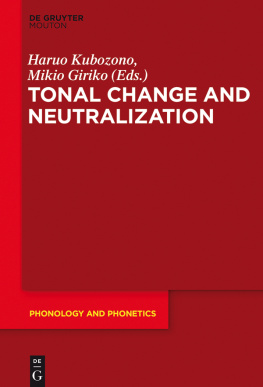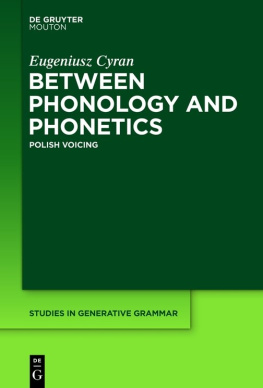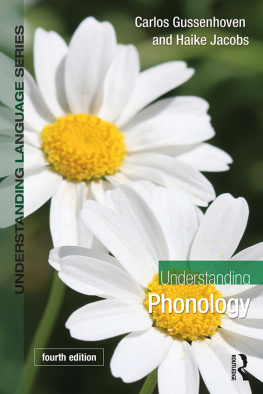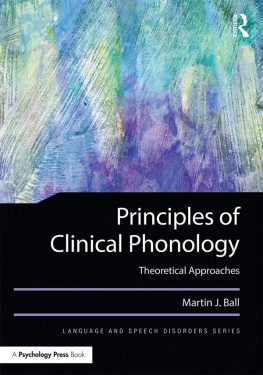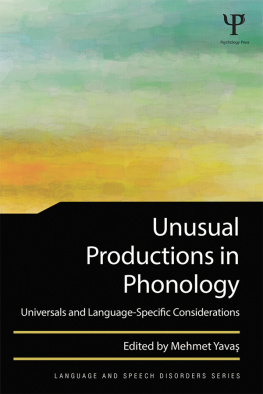Shuxiang You - Prosodic Phonology of the Fuzhou Dialect
Here you can read online Shuxiang You - Prosodic Phonology of the Fuzhou Dialect full text of the book (entire story) in english for free. Download pdf and epub, get meaning, cover and reviews about this ebook. year: 2020, publisher: Routledge, genre: Children. Description of the work, (preface) as well as reviews are available. Best literature library LitArk.com created for fans of good reading and offers a wide selection of genres:
Romance novel
Science fiction
Adventure
Detective
Science
History
Home and family
Prose
Art
Politics
Computer
Non-fiction
Religion
Business
Children
Humor
Choose a favorite category and find really read worthwhile books. Enjoy immersion in the world of imagination, feel the emotions of the characters or learn something new for yourself, make an fascinating discovery.
- Book:Prosodic Phonology of the Fuzhou Dialect
- Author:
- Publisher:Routledge
- Genre:
- Year:2020
- Rating:5 / 5
- Favourites:Add to favourites
- Your mark:
- 100
- 1
- 2
- 3
- 4
- 5
Prosodic Phonology of the Fuzhou Dialect: summary, description and annotation
We offer to read an annotation, description, summary or preface (depends on what the author of the book "Prosodic Phonology of the Fuzhou Dialect" wrote himself). If you haven't found the necessary information about the book — write in the comments, we will try to find it.
Prosodic Phonology of the Fuzhou Dialect — read online for free the complete book (whole text) full work
Below is the text of the book, divided by pages. System saving the place of the last page read, allows you to conveniently read the book "Prosodic Phonology of the Fuzhou Dialect" online for free, without having to search again every time where you left off. Put a bookmark, and you can go to the page where you finished reading at any time.
Font size:
Interval:
Bookmark:

Prosodic Phonology of the Fuzhou Dialect: Domains and Rule Application is the first attempt to conduct a comprehensive analysis of the Fuzhou phonological system from the perspective of prosodic phonology.
It addresses the following issues: what prosodic constituents exist in the Fuzhou dialect and what kinds of roles they play in the Fuzhou phonological system; how to define the domain formation of these prosodic constituents in the Fuzhou dialect; what kinds of Fuzhou phonological phenomena make crucial reference to these prosodic constituents as the domain of application; and what implications does the study of the Fuzhou phonological system have for the prosodic phonology theory.
This book is a valuable text for students and scholars in the field of Chinese dialectology, Min dialects, prosodic phonology, and phonology-morphosyntax interface.
Shuxiang You is Research Assistant Professor in the Department of Linguistics and Modern Languages at the Chinese University of Hong Kong. He received his M.A. and Ph.D. in Chinese Linguistics from the University of WisconsinMadison in 2013 and 2017 respectively. His research interests include phonology, phonology-syntax interface, Chinese dialectology, and teaching Chinese as a second language.
Routledge Studies in Chinese Linguistics
Series editor: Hongming Zhang
Mandarin Loanwords
Tae Eun Kim
Intensification and Modal Necessity in Mandarin Chinese
Jiun-Shiung Wu
The Architecture of Periphery in Chinese
Cartography and Minimalism
Victor Pan
Focus Manifestation in Mandarin Chinese and Cantonese
A Comparative Perspective
Peppina Po-lun Lee
Prominence and Locality in Grammar
The Syntax and Semantics of Wh-Questions and Reflexives
Jianhua Hu
Prosodic Studies
Challenges and Prospects
Edited by Hongming Zhang and Youyong Qian
Diachronic Perspectives and Synchronic Variation in Southern Min
Edited by Chinfa Lien and Alain Peyraube
Prosodic Phonology of the Fuzhou Dialect
Domains and Rule Application
Shuxiang You
For more information about this series, please visit: www.routledge.com/languages/series/RSICL

First published 2020
by Routledge
2 Park Square, Milton Park, Abingdon, Oxon OX14 4RN
and by Routledge
52 Vanderbilt Avenue, New York, NY 10017
Routledge is an imprint of the Taylor & Francis Group, an informa business
2020 Shuxiang You
The right of Shuxiang You to be identified as author of this work has been asserted by him in accordance with sections 77 and 78 of the Copyright, Designs and Patents Act 1988.
All rights reserved. No part of this book may be reprinted or reproduced or utilised in any form or by any electronic, mechanical, or other means, now known or hereafter invented, including photocopying and recording, or in any information storage or retrieval system, without permission in writing from the publishers.
Trademark notice: Product or corporate names may be trademarks or registered trademarks, and are used only for identification and explanation without intent to infringe.
British Library Cataloguing-in-Publication Data
A catalogue record for this book is available from the British Library
Library of Congress Cataloging-in-Publication Data
Names: You, Shuxiang, author.
Title: Prosodic phonology of the Fuzhou dialect : domains and rule application / Shuxiang You.
Description: New York : Routledge, 2020. | Series: Routledge studies in Chinese linguistics | Includes bibliographical references and index. |
Summary: Prosodic Phonology of the Fuzhou Dialect: Domains and Rule Application is the first attempt to conduct a comprehensive analysis of the Fuzhou phonological system from the perspective of prosodic phonology. It addresses the following issues: What prosodic constituents exist in the Fuzhou dialect and what kinds of roles they play in the Fuzhou phonological system; how to define the domain formation of these prosodic constituents in the Fuzhou dialect; what kinds of Fuzhou phonological phenomena make crucial reference to these prosodic constituents as the domain of application; and what implications does the study of the Fuzhou phonological system have for the prosodic phonology theory. This book is a valuable text for students and scholars in the field of Chinese dialectology, Min dialects, prosodic phonology, and phonology-morphosyntax interface Provided by publisher.
Identifiers: LCCN 2019051724 (print) | LCCN 2019051725 (ebook) | ISBN 9780367199487 (hardback) | ISBN 9780429244292 (ebook)
Subjects: LCSH: Chinese languageDialectsChinaFuzhou Shi (Fujian Sheng)Phonology. | Northern Min dialectsChinaFuzhou Shi (Fujian Sheng)Phonology. | Chinese languagePhonology. | Chinese languageVersification.
Classification: LCC PL1690.F8 Y68 2020 (print) | LCC PL1690.F8 (ebook) | DDC 495.17dc23
LC record available at https://lccn.loc.gov/2019051724
LC ebook record available at https://lccn.loc.gov/2019051725
ISBN: 978-0-367-19948-7 (hbk)
ISBN: 978-0-429-24429-2 (ebk)
Typeset in Times New Roman
by Apex CoVantage, LLC
To My Beloved Yanwen
Figures
Tables
This book is a revised and extended version of my Ph.D. dissertation submitted to the University of WisconsinMadison in 2017. It would not have been possible to give birth to this book without all the guidance, support, and encouragement from many people. Most immediately, I would like to express my greatest gratitude to my Ph.D. advisor, Professor Hongming Zhang, who has given me constant support, guidance, and inspiration over the years. He offered me various opportunities to get professional training in Chinese linguistics, and there would never be any way for me to become a linguist and complete this book without his valuable expertise, insightful suggestions, and devoted encouragement.
I would like to extend my sincere appreciation to my Ph.D. dissertation committee members, Professor Yafei Li, Professor Eric Raimy, Professor William Nienhauser, and Professor Weihua Zhu, for their intellectual help and compassionate support throughout the dissertation project. Many of their constructive comments and invaluable suggestions I received at the defense of my dissertation have been integrated in this book. I am also obliged to Professor Marlys Macken, who retired before my defense. She not only helped me build up my phonological knowledge, but also taught me how to conduct linguistic fieldwork, which serves as the foundation of my dissertation. Since the completion of my dissertation, the contents of some chapters have been presented at several conferences. My gratitude goes to the audiences for their questions and feedback.
I am very much grateful to the Routledge press for granting permission to reproduce material in my paper Enclitics and the clitic group consisting of host + enclitic in the Fuzhou dialect, which was included in the book Prosodic Studies: Challenges and Prospects edited by Professor Hongming Zhang and Professor Youyong Qian in 2019. I am also deeply grateful to John Benjamins Publishing Company for permission to reprint material in my Chinese language paper [Clitics and the clitic group in the Fuzhou dialect], which was published in the
Font size:
Interval:
Bookmark:
Similar books «Prosodic Phonology of the Fuzhou Dialect»
Look at similar books to Prosodic Phonology of the Fuzhou Dialect. We have selected literature similar in name and meaning in the hope of providing readers with more options to find new, interesting, not yet read works.
Discussion, reviews of the book Prosodic Phonology of the Fuzhou Dialect and just readers' own opinions. Leave your comments, write what you think about the work, its meaning or the main characters. Specify what exactly you liked and what you didn't like, and why you think so.

